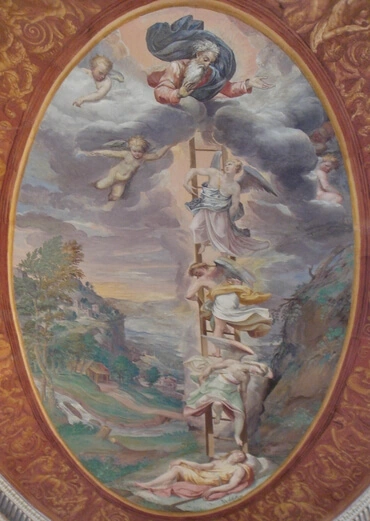1
Und es versammelte sich die ganze Gemeine der Kinder Israel gen Silo und richteten daselbst auf die Hütte des Stifts. Und das Land war ihnen unterworfen.
2
Und waren noch sieben Stämme der Kinder Israel, denen sie ihr Erbteil nicht ausgeteilet hatten.
3
Und Josua sprach zu den Kindern Israel: Wie lange seid ihr so laß, daß ihr nicht hingehet, das Land einzunehmen, das euch der HERR, eurer Väter Gott, gegeben hat?
4
Schaffet euch aus jeglichem Stamm drei Männer, daß ich sie sende, und sie sich aufmachen und durchs Land gehen und beschreiben es nach ihren Erbteilen und kommen zu mir.
5
Teilet das Land in sieben Teile. Juda soll bleiben auf seiner Grenze von Mittag her, und das Haus Joseph soll bleiben auf seiner Grenze von Mitternacht her.
6
Ihr aber beschreibet das Land der sieben Teile und bringet sie zu mir hieher, so will ich euch das Los werfen vor dem HERRN, unserm Gott.
7
Denn die Leviten haben kein Teil unter euch, sondern das Priestertum des HERRN ist ihr Erbteil. Gad aber und Ruben und der halbe Stamm Manasse haben ihr Teil genommen jenseit des Jordans gegen dem Morgen, das ihnen Mose, der Knecht des HERRN, gegeben hat.
8
Da machten sich die Männer auf, daß sie hingingen. Und Josua gebot ihnen, da sie hin wollten gehen, das Land zu beschreiben, und sprach: Gehet hin und durchwandelt das Land und beschreibet es und kommt wieder zu mir, daß ich euch hie das Los werfe vor dem HERRN zu Silo.
9
Also gingen die Männer hin und durchzogen das Land und beschrieben es auf einen Brief nach den Städten in sieben Teile; und kamen zu Josua ins Lager gen Silo.
10
Da warf Josua das Los über sie zu Silo vor dem HERRN und teilete daselbst das Land aus unter die Kinder Israel, einem jeglichen sein Teil.
11
Und das Los des Stamms der Kinder Benjamin fiel nach ihren Geschlechtern, und die Grenze ihres Loses ging aus zwischen den Kindern Juda und den Kindern Joseph.
12
Und ihre Grenze war an der Ecke gegen Mitternacht vom Jordan an und gehet herauf an der Seite Jerichos von mitternachtwärts; und kommt aufs Gebirge gegen abendwärts und gehet aus an der Wüste Beth-Aven;
13
und gehet von dannen gen Lus, an der Seite her an Lus gegen mittagwärts, das ist Bethel, und kommt hinab gen Atharoth-Adar an dem Berge, der vom Mittag liegt an dem niedern Beth-Horon.
14
Danach neiget sie sich und lenket sich um zur Ecke des Abends gegen Mittag von dem Berge, der vor Beth-Horon gegen mittagwärts liegt, und endet sich an Kiriath-Baal, das ist Kiriath-Jearim, die Stadt der Kinder Juda; das ist die Ecke gegen Abend.
15
Aber die Ecke gegen Mittag ist von Kiriath-Jearim an und gehet aus gegen Abend und kommt hinaus zum Wasserbrunnen Nephthoah;
16
und gehet herab an des Berges Ende, der vor dem Tal des Sohns Hinnoms liegt, welches im Grunde Raphaim gegen Mitternacht liegt; und gehet herab durchs Tal Hinnom an der Seite der Jebusiter am Mittag und kommt hinab zum Brunnen Rogel;
17
und zeucht sich von mitternachtwärts und kommt hinaus gen En-Semes und kommt hinaus zu den Haufen, die gegen Adumim hinauf liegen, und kommt herab zum Stein Bohen, des Sohns Rubens;
18
und gehet zur Seite hin neben dem Gefilde, das gegen Mitternacht liegt, und kommt hinab aufs Gefilde;
19
und gehet an der Seite Beth-Haglas, die gegen Mitternacht liegt, und ist sein Ende an der Zunge des Salzmeers gegen Mitternacht an dem Ort des Jordans gegen Mittag. Das ist die Mittagsgrenze.
20
Aber die Ecke gegen Morgen soll der Jordan enden. Das ist das Erbteil der Kinder Benjamin in ihren Grenzen umher unter ihren Geschlechtern.
21
Die Städte aber des Stamms der Kinder Benjamin, unter ihren Geschlechtern sind diese: Jericho, Beth-Hagla, Emek-Reziz,
22
Beth-Araba, Zemaraim, Bethel.
23
Avim, Hapara, Ophra,
24
Kaphar-Amonai, Aphni, Gaba. Das sind zwölf Städte und ihre Dörfer.
26
Mizpe, Kaphira, Moza,
27
Rekem, Jerpeel, Thareala,
28
Zela, Eleph und die Jebusiter, das ist Jerusalem, Gibeath, Kiriath: vierzehn Städte und ihre Dörfer. Das ist das Erbteil der Kinder Benjamin in ihren Geschlechtern.







